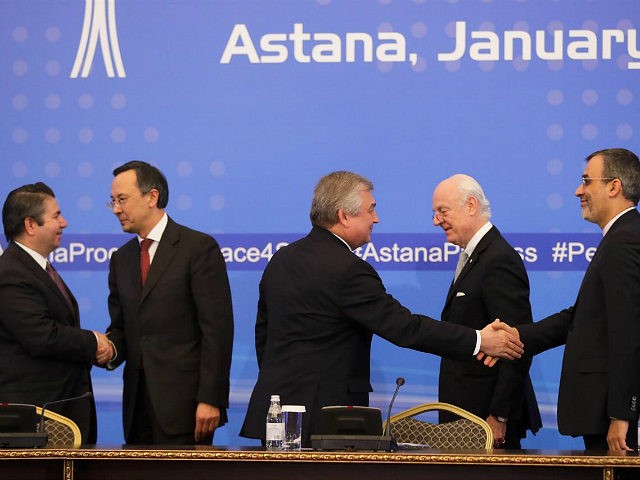Russia and Turkey are hailing the Syria peace talks in Kazakhstan as a rousing success.
Turkish Prime Minister Binali Yildirim was especially enthusiastic, calling the talks a “serious diplomatic success” because his country agreed with Russia and Iran on a system for monitoring ceasefire violations.
The Associated Press reports Yildirim said this agreement “could pave the way for a political solution in the war-torn nation.” He included a revised Syrian administration, respect for the country’s territorial integrity, and a role for opposition parties in the government as components of this solution, but he pointedly did not say what would become of dictator Bashar Assad.
Turkey has a serious difference of opinion with Russia and Iran about whether Assad should remain in power. The Turks have long been opposed to the Assad regime, while Russia supports it, and Iran has been quite adamant about keeping Assad on his throne.
Kremlin spokesman Dmitry Peskov also called the talks a “success” and said there could be further rounds of discussion in the future, according to Reuters. Peskov also told reporters he thought the Kazakhstan conference might jump-start UN-backed negotiations on Syria’s fate in Geneva.
As for Iran, a Western diplomat suggested to The Washington Post that it could “play the role of a spoiler in the Russian efforts to get the cease-fire on track,” although for the moment, Tehran seems to be on board with the trilateral enforcement system Russia and Turkey announced.
The nature of Iran’s spoiler role was elaborated upon by analyst Alexei Malashenko of the Carnegie Moscow Center: “The Iranian role makes Assad less dependent on Russia and able to act militarily, and this is very dangerous because it undermines the Kremlin’s efforts to promote some kind of political process in Syria.”
In other words, Iran might push for a more decisive, and bloody, Assad victory over the resistance than Russia and Turkey are willing to settle for. Opposition groups complained repeatedly at the Kazakhstan talks that Syrian regime forces were violating the ceasefire to strike their positions with little complaint from Russia or its partners. The opposition was also described by The Washington Post as notably less comfortable with Iran’s role in policing the ceasefire.
CNN’s take on the talks in Astana was considerably less optimistic than the Russian and Turkish government lines (and that of Kazakhstan, which is hoping to make a diplomatic name for itself by hosting the talks.)
CNN’s report colorfully compares the participants to feuding cliques giving each other the cold shoulder at a high-school prom:
Here, in Astana, the dance of diplomacy has seen more snubs than a high school prom. The Syrian opposition delegation would not meet face to face with the government representatives.
The government representative would not meet directly with the Turkish officials.
The Turkish officials would meet with the Russians — but only in their capacity as intermediaries on opposite side of the conflict.
Moscow, Tehran and Ankara brokered the Astana talks. But the UN had brokered its own Geneva talks. The two tracks plan to dance in partnership, according to officials, but analysts say Russia is controlling the focus.
Some rebels refused to even come to the talks, and others like Jabhat Fateh al-Sham, a former al-Qaeda affiliate, were never invited. Each of the warring factions quickly threw themselves into the drama.
CNN noted that the U.S. ambassador to Kazakhstan, George Krol, would not comment on the proceedings, despite having been invited to observe. This was taken as “an indication of the US’ waning influence on the Syrian crisis.”
Reuters notes that while many rebel factions had representatives in Astana, the rest of the opposition was busy shooting at each other back home in Syria:
In northwest Syria, heavy fighting erupted between the jihadist group Jabhat Fateh al-Sham and Free Syrian Army factions who were represented at the Astana talks.
FSA groups are reeling after being driven from Aleppo city last month by government forces and their allies. Any further loss of territory in their main northern stronghold – this time at the hands of jihadist insurgents – could leave them too weak to achieve any meaningful gains from peace negotiations.
In former President Barack Obama’s policy vision, the Free Syrian Army was the great “moderate” hope for Syria. It was supposed to defeat ISIS and al-Qaeda, as well as overthrow the Assad regime, with arms and training from the United States and its allies. Now the FSA is on the verge of becoming too weak to even participate meaningfully in peace talks, while the United States is relegated to silent observer status.

COMMENTS
Please let us know if you're having issues with commenting.